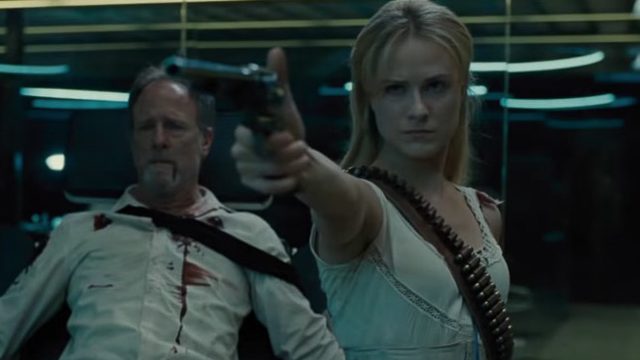SUMMARY
This is AI generated summarization, which may have errors. For context, always refer to the full article.

On its surface, “Les Écorchés” seems like an inevitable convergence of the events and teases from previous episodes. There is payback, elegant violence, musings on existence, and the return of a beloved character – all the ingredients for a great Westworld episode.
Over the course of two seasons, Westworld has dedicated lots of time exploring the nature of self and sentience. But in “Les Écorchés,” the show introduces another ingredient for self-realization: mortality. What good is living, of being awake, when you can simply be rebooted ad nauseam?
Team Dolores succeeds in blowing up the Cradle, the server farm containing all the Hosts’ back-ups. Without the Cradle, the Hosts are, by Dolores’ reckoning, free. Park domination, world domination… all that can wait.
What Dolores wants now is, simply, to be mortal.
That goal seems to be the result of a conversation Dolores and Arnold had in the first episode of the season. “What is real?” Dolores asked, to which Arnold answered: “That which is irreplaceable.”
Dolores commented that the answer isn’t completely honest. But that answer seems to have led Dolores down this path. How can you be truly irreplaceable? Simple: destroy the facility containing your backups.
She also finds Abernathy, and after learning that the DNA records stored in his head were causing his glitches, makes a difficult decision. She kills her father, cuts his head open and retrieves his control unit. Her decision works on two levels: she frees her father from his torment, but also gains possession of a trump card as a result.
The end of the world as they know it
The destruction of the Cradle is also a huge dick punch to Delos. Next to the DNA records in Abernathy’s control unit, the narratives and Host backups stored in the Cradle are Delos’ most valuable IP.
Before the destruction of the Cradle, Bernard manages to find Ford within it. We learn about Delos’ grand scheme for Westworld… or rather, grand scheme for humanity. Delos is making a play for human immortality. To do this, it has to digitize the human mind, the last analog device in a digital world, as Ford puts it.
The park, it turns out, is a glorified data-mining effort. The part isn’t just about coding Hosts, it’s also about decoding humans. By putting humans in an environment where they can act on their basest impulses, Delos can better map the human mind.
Delos’ endgame is still a bit unclear. We know that their efforts to upload the consciousness of founder James Delos into a Host body have been unsuccessful. The transplanted James Delos worked fine initially, but eventually hit a cognitive plateau and, as a result, had to be put down.
Ford knows he wouldn’t be able to function as a transplanted consciousness, which is why he opted to stay inside the Cradle. But with the Cradle’s destruction imminent, Ford enters Bernard’s mind. It’s a mutually-beneficial set-up. Ford comments that Bernard, brilliant as he is, can’t make it on his own. And Ford, in turn, won’t survive the physical destruction of the Cradle.
It isn’t so much a melding of minds as it is using Bernard as a walking thumb drive. In the real world, Ford becomes a sort of disembodied Tinker Bell guiding Bernard and helping him survive.
More human than human
“Les Écorchés” draws a deep line in the sand between the motivations of the humans, and that of the Hosts. Humans want to be more like Hosts – that is immortal and infinitely re-bootable. Hosts, on the other hand, want to live without the stifling presence of a safety net.
In that regard, William, with his bloodlust and apparent death wish, is more Host-like than human. Facing a life full of wasted years and lost loved ones, William continuously flirts with death. (His daughter Emily even goes so far as to label his quest a suicide by robot.)
In “Les Écorchés,” William runs into Maeve and her daughter, setting up a repeat of the memory that has haunted Maeve. William assumes this is a set up by Ford. It’s comical how the man assumes everything thrown his way is a ruse concocted by Ford.
In the past, William killed Maeve. But now that Maeve is a certified badass, she plants a couple of bullets in William. He runs off, but Maeve commands his Host companions to subdue him. When Lawrence appears, Maeve doesn’t outright order him to kill William. Instead, she restores Lawrence’s memories, which include that of include William killing his wife. Enraged, Lawrence shoots William.
The scene would have been a fitting end to the Man in Black character, whose presence has become a bit tedious these last few episodes. But before Lawrence can make the killing shot, members of Delos QC storm the scene. The Man in Black’s story isn’t over yet. But with multiple gunshot wounds, here’s hoping that the deeper level of his game can be found at the bottom of a grave.
Maeve is shot during the raid, but Sizemore, who was in one of the Delos vehicles, takes her back to the Mesa. There, Dolores offers to give Maeve a merciful death.
“They’ll torture you,” Dolores says. “They’ll find all that is good and powerful inside you and turn it against us.”
Maeve turns down Dolores’ offer. She lost her daughter yet again, and she is driven to find her. Without the Cradle’s backup, this life (or what’s left of it) is all Maeve has. There’s real tension, real stakes here. Maeve chose to go after what is irreplaceable and, as a result, becomes more human than human. – Rappler.com
Add a comment
How does this make you feel?
There are no comments yet. Add your comment to start the conversation.